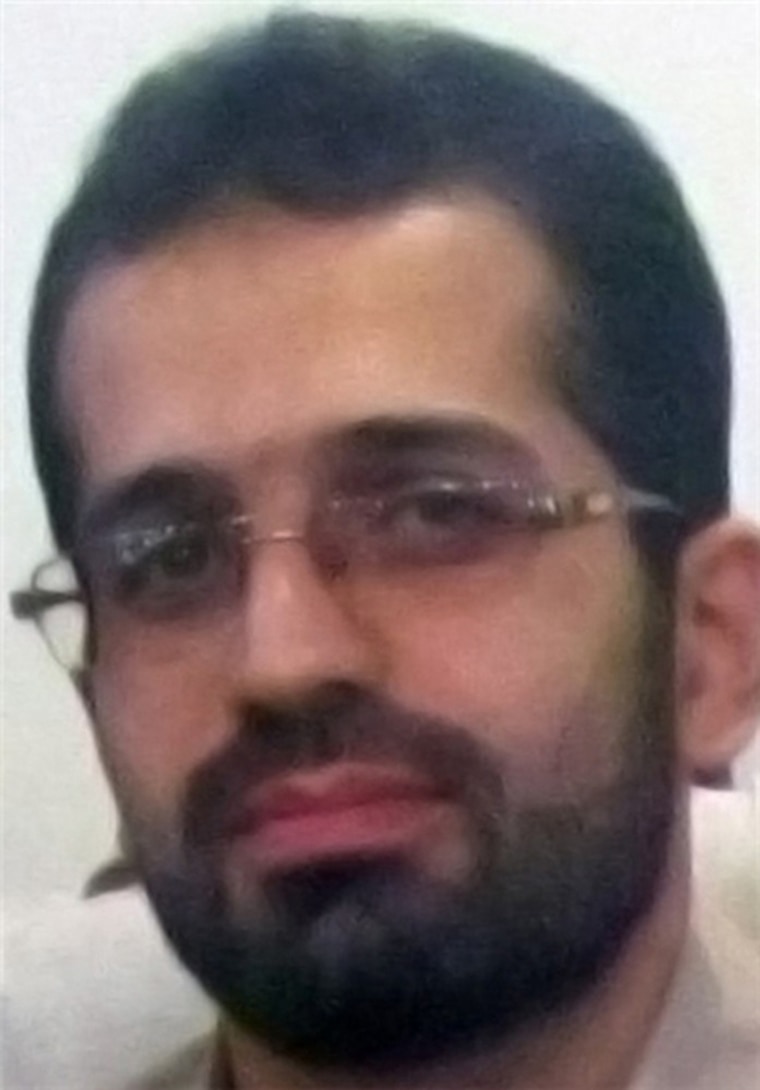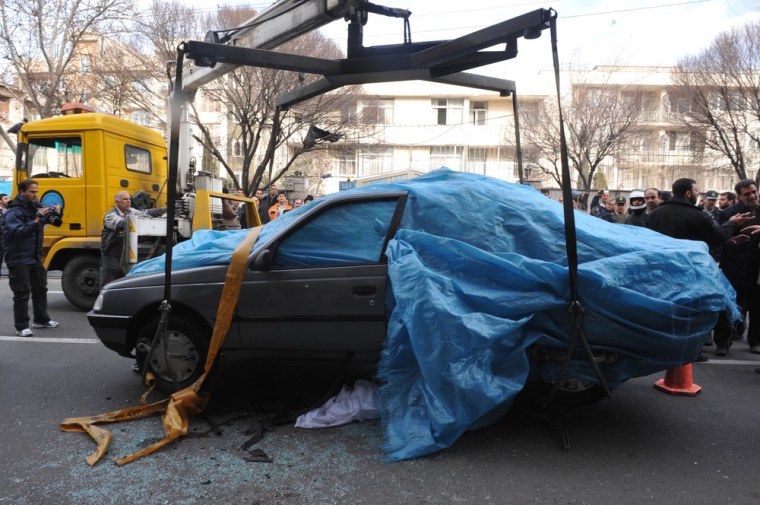Updated at 1:15 p.m. ET: The Obama administration is denying any role in the killing of an Iranian university professor working at a key nuclear facility. White House spokesman Tommy Vietor said the U.S. "had absolutely nothing to do" with Mostafa Ahmadi Roshan's death and the U.S. condemns "all acts of violence, including acts of violence like what is being reported today."
Published at 9:46 am ET: Two assailants on a motorcycle attached a magnetic bomb to the car of an Iranian university professor working at a key nuclear facility, killing him and wounding two people on Wednesday, a semiofficial news agency reported.
The attack in Tehran bore a strong resemblance to earlier killings of scientists working on the Iranian nuclear program.
It is certain to reinforce authorities' claims of widening clandestine operations by Western powers and allies to try to cripple nuclear advancements.
The bomb killed Mostafa Ahmadi Roshan, a chemistry expert and a director of the Natanz uranium enrichment facility in central Iran, the semiofficial Fars news agency reported.
Natanz is Iran's main enrichment site, but officials claimed earlier this week that they are expanding some operations to an underground site south of Tehran with more advanced equipment.
Witnesses told Reuters they had seen two people on the motorcycle fix a bomb to the car.
"The bomb was a magnetic one and the same as the ones previously used for the assassination of the scientists, and is the work of the (Israelis)," Fars quoted Tehran's Deputy Governor Safarali Baratloo as saying. "The terrorist attack is a conspiracy to undermine the (March 2) parliamentary elections."
'Our path is irreversible'
Iran's Atomic Energy Organization said the country's nuclear path would not change despite the killing, which it branded a "heinous act".
"Our path is irreversible," Arabic language al-Alam TV quoted an agency statement as saying.
The U.S. and its allies are pressuring Iran to halt uranium enrichment, a key element of the nuclear program that the West suspects is aimed at producing atomic weapons. Uranium enriched to low levels can be used as nuclear fuel but at higher levels, it can be used as material for a nuclear warhead. Iran denies it is trying to make nuclear weapons.
Tehran has accused Israel's Mossad, the CIA and Britain's spy agency of engaging in an underground "terrorism" campaign against nuclear-related targets, including at least three slayings since early 2010 and the release of a malicious computer virus known at Stuxnet in 2010 that temporarily disrupted controls of some centrifuges — a key component in nuclear fuel production. All three countries have denied the Iranian accusations.
But Israeli officials have hinted about covert campaigns against Iran without directly admitting involvement.
On Tuesday, Israeli military chief Lt. Gen Benny Gantz was quoted as telling a parliamentary panel that 2012 would be a "critical year" for Iran — in part because of "things that happen to it unnaturally."

Roshan, 32, was inside the Iranian-assembled Peugeot 405 car together with two others when the bomb exploded in north Tehran, Fars reported.
Roshan was a graduate of the prestigious Sharif University of Technology in Tehran.
Roshan was involved in building polymeric layers for gas separation, which is the use of various membranes to isolate gases. He was also deputy director of the Natanz uranium enrichment plant, in central Iran, for commercial affairs. According to conservative news website, mashreghnews.ir, Roshan was in charge of purchasing and supplying equipment for the Natanz enrichment facility.
A similar bomb explosion on Jan. 12, 2010, killed Tehran University professor Masoud Ali Mohammadi, a senior physics professor. He was killed when a bomb-rigged motorcycle exploded near his car as he was about to leave for work.
In November 2010, a pair of back-to-back bomb attacks in different parts of the capital killed one nuclear scientist and wounded another.
High-voltage switches
The slain scientist, Majid Shahriari, was a member of the nuclear engineering faculty at Shahid Beheshti University in Tehran and cooperated with the Atomic Energy Organization of Iran. The wounded scientist, Fereidoun Abbasi, was almost immediately appointed head of Iran's atomic agency.
And in July 2011, motorcycle-riding gunmen killed Darioush Rezaeinejad, an electronics student. Other reports identified him as a scientist involved in suspected Iranian attempts to make nuclear weapons.
Rezaeinejad allegedly participated in developing high-voltage switches, a key component in setting off the explosions needed to trigger a nuclear warhead.
The United States and other countries say Iran is trying to develop nuclear weapons technology. Iran denies the allegations, saying that its program is intended for peaceful purposes.
Video: War of words with Iran escalates
The latest blast is certain to bring fresh charges by Iran that the U.S. and allies are waging a clandestine campaign of bloodshed and sabotage in attempts to set back Iran's nuclear efforts.
"Instead of actually fighting a conventional war, Western powers and their allies appear to be relying on covert war tactics to try to delay and degrade Iran's nuclear advancement," said Theodore Karasik, a security expert at the Dubai-based Institute for Near East and Gulf Military Analysis.
'Clean, easy and efficient'
He said the use of magnetic bombs bears the hallmarks of covert operations.
"It's a very common way to eliminate someone," he added. "It's clean, easy and efficient."
Meanwhile, new U.S. sanctions against Iran have also started to bite. The rial currency lost 20 percent of its value against the dollar in the past week and Iran has threatened to shut the Strait of Hormuz, through which 40 percent of trade oil passes.
Meir Javedanfar, an Iranian-born analyst based in Israel, said Iran's leadership is being pushed toward a decision on whether to "retaliate or compromise" as sanctions squeeze the economy.
"From the international consensus that we can see against Iran, even if (Supreme Leader Ayatollah Ali Khamenei) does retaliate, it's not very likely that the pressure — sanctions and isolation — would ease," he said. "He's in a tight spot."
